A guide for B2B SEO
B2C and SEO are a natural fit. If you're a property website selling houses (like Zillow or Zoopla), it makes instinctive sense that search is a good marketing channel.
Someone wants to buy a house, they search on Google, they buy it.
(Buying a house. Obviously not that easy, you get the idea.)
B2B doesn't fit quite as well. The sales processes are larger, decisions are made by more people with different criteria, the route from search to success isn't quite as obvious.
But that just makes a more fun challenge :)
This post is going to answer two big questions:
- Can everyone succeed at it or are some companies better placed?
- How can you be successful at it?
This post won't:
- Teach you SEO from scratch, you're going to need some knowledge to actually follow this. If you're at a B2B company and coming from scratch, I'd recommend reading Moz's beginners guide to SEO first. It's still great!
This post is the text version of a presentation I've given, if you're coming for the slides, I've put them above, hopefully it will job your memory! If you're not, don't worry I've put everything you need in text :)
Before we get started lets set some context
There are some crucial differences between B2B & B2C companies. All of these points lead to knock affects for search that we'll delve into.
- The sales funnels are longer. People will take longer to come to a decision. Say hello to legal & procurement.
- There are more people involved in buying. It's rarely one person who will make decision, you'll often need to persuade many.
- The number of customers is smaller. B2C companies are often targeting very broad groups, B2B is usually smaller.
- The buying factors are different, businesses will bring more requirements to the table, you might need to be able to integrate with existing systems.
Can every business succeed in search?
There is no cut and dry answer to this. Hooray for not tasking a stance.
In my experience, most B2B companies can get value out of search.
There are a couple different aspects of a company that can wildly change how useful search will be and most of them can't be changed very quickly.
Lets look at those.
- Target market size
- Length of the sales funnel
- Innovation
We're also going to look at:
- How quickly do you need results
This isn't specific to B2B... but it is super relevant when asking this question so we're putting in anyway.
Target market size
Compare getting one more organic visitor vs one more paid visitor on your website.
- The extra organic visit is free.
- The extra paid visit isn't.
Now search isn't free traffic, that's just not true, but search costs are fixed costs. e.g. You have to pay for writers, but they don't cost more if more people visit your website.
The more people we reach from our search content, the more efficient our spend is.
How large is your market? The smaller it is, the more efficient paid spend is.
If you literally had a market of 10 people, you'll be better off trying to meet them at all those fancy charity dinners rather than writing search articles.
Audience size will often get larger overtime for many B2B companies, that means often organic will become valuable if they've been around longer.
The larger your audience the more efficient search will be.
The longer the B2B company has existed, typically the larger the market and more value there is to be had.
Length of the sales funnel
How long is your sales funnel?
Is it a month, 6 months?
The longer your sales funnel & the more decision makers you're selling to, the harder it will be to correctly value search.
Organic typically plays towards the upper end of the sales funnel in B2B. It's valuable in building a brand, creating awareness & initial comparison (although even that is gets competitive quickly).
(Side note: The larger & more well established you are the more you get a chance to play lower in the funnel, if someone from Salesforce is reading this you do get play lower.)
Essentially this creates an organisational problem, search might be super valuable for you, but you're going to have to fight tooth and nail to prove it and get budget.
Everyone else lower in the that funnel will be screaming about there value, you can bet.
The shorter your sales process & the fewer decision makers in the process, the easier it’ll be to argue for search in your organisation.
Innovation
How innovative are you?
If the product you are selling is brand new, no-one will actually be searching for it.
Your marketing will have to look more like brand building than jumping on existing search volume.
Take AWS lambda.
Doesn't matter if you don't know what that is, for the purposes of this story it is:
- A new shiny innovative thing.
- One of the generic names to describe it is "serverless computing"
When AWS first launched it in Nov 2014, no-one was searching for it. They had to build demand.
When Google Cloud & Azure launched into it, it was more established and they did have an opportunity to hop on existing searches rather than just go from scratch.
If you’ve invented something brand new, you’ll have to create search volume.
How quick do you need results?
At this point I often get a lot of very small businesses asking me if they should invest in search. The following applies to B2C as well as B2B, but we'll mention it here anyway.
SEO is not the fastest channel to see results. In order to get anywhere you're going to need:
- Content
- Authority
- Basic technical competance
That might be quite a bit of upfront investment. It might be mean:
- Hiring someone
- Getting a website which is tolerable for search.
- Putting out some press releases & building links.
People can find search takes takes months, sometimes a year to get off the ground. It's usually not the way to get your first set of customers, or even your second.
Just make sure, when you're a year or two down the road and paid acquisition is starting to get expensive, that you can still transition into search.
What are B2B companies doing to be successful?
As part of the research for the presentation, I took my sample of B2B websites, filtered out all the branded traffic and went to see where websites were getting their non-branded traffic from.
I've categorised the results.
-
| Category | Percentage of total unbranded traffic of sample |
|---|---|
| homepage | 16.26% |
| product page | 15.59% |
| guide | 13.86% |
| mass generated product pages | 13.02% |
| listicle | 10.88% |
| definition | 10.76% |
| templates | 5.47% |
| user generated content | 4.23% |
| tool | 2.99% |
| difference | 2.43% |
| best | 2.41% |
| content | 1.18% |
Definitions at the bottom in the appendix
Of these options, all bar 3 are informational content focus:
-
| Category | Percentage of total unbranded traffic of sample |
|---|---|
| homepage | 16.26% |
| product page | 15.59% |
| content | 13.86% |
| mass generated product pages | 13.02% |
| content | 10.88% |
| content | 10.76% |
| content | 5.47% |
| content | 4.23% |
| content | 2.99% |
| content | 2.43% |
| content | 2.41% |
| content | 1.18% |
So either we're doing one of those 3 things or we're doing informational content, lets talk about these two first:
- Mass generated product pages.
- Home & product pages.
Mass generated product pages
What is it: Mass generated pages with similar pages based on some aspect of the product.
I don't really have a better way of saying it so lets just show some examples.
Examples
Zapier is a piece of software that allows you to connect different apps. E.g. Trello & GDrive.
When you add a card in Trello you could create a GDoc in GDrive.
They generate a landing page for any of the popular combinations of products. e.g.:
Trello + Google Drive
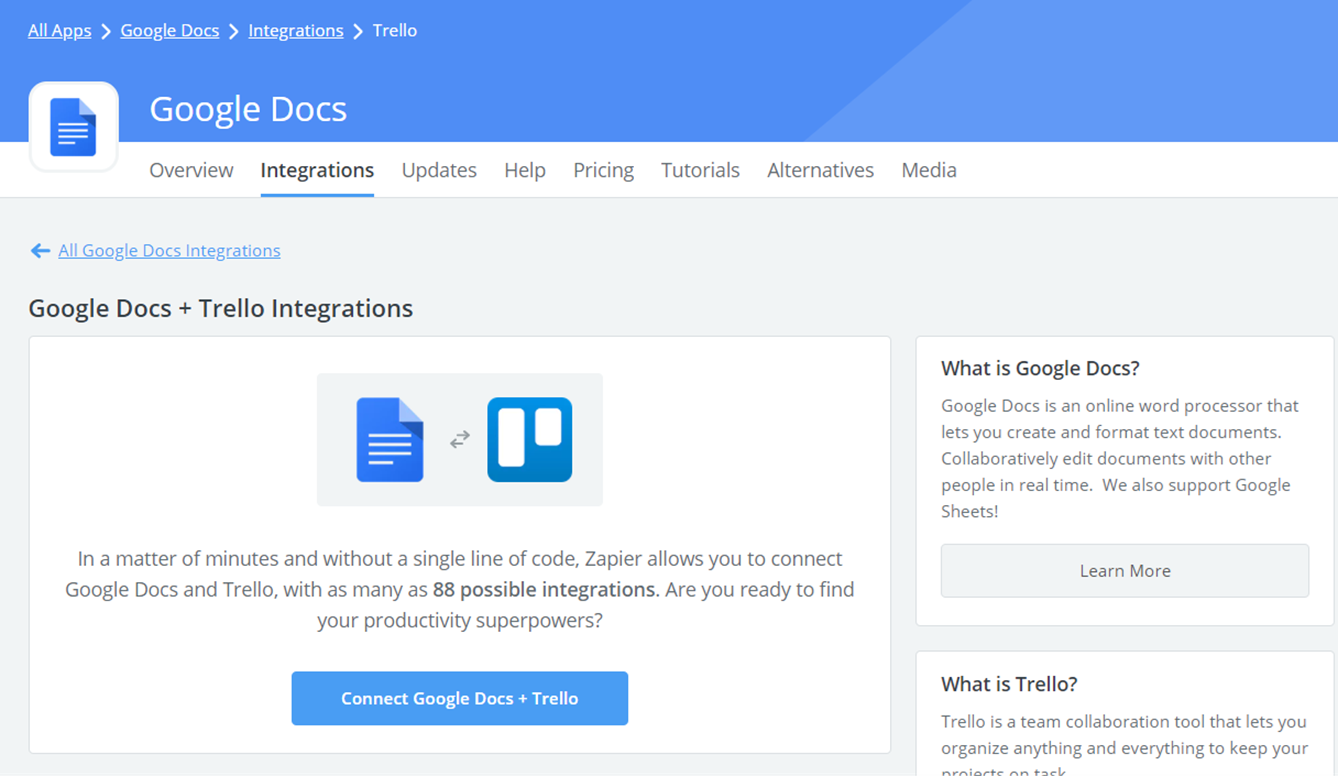
Pipedrive + Trello
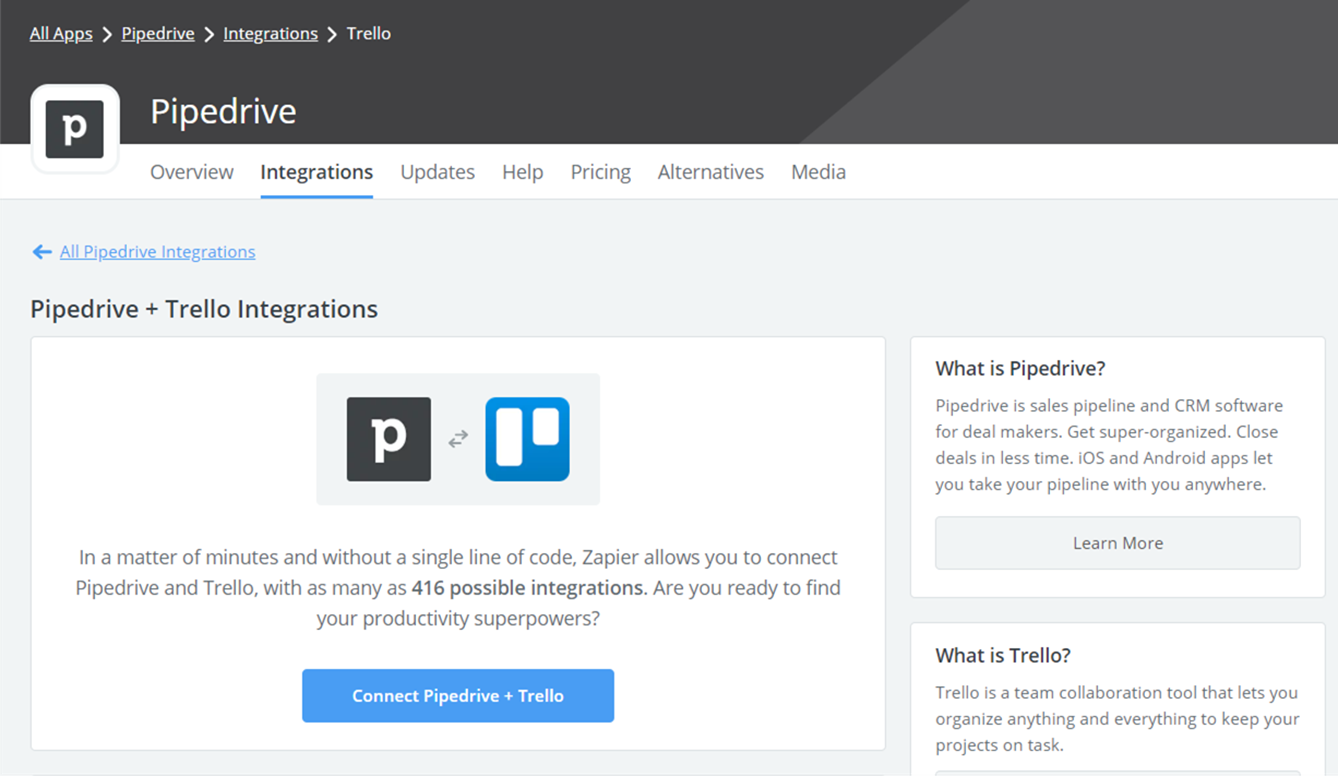
That is a mass generated product page.
SimilarWeb is another example, they index pages for many popular websites that show common statistics.
If you can do this, fantastic. SEO will often be very valuable for you. However the reality is for many B2B businesses this just isn't an option. There product can't mass generate pages in a useful way.
Homepage and product pages
What is it: This is where you're using homepage or product pages to rank for important terms.... Nothing mind blowing yet.
Examples
For example Hubspot ranks for crm with a product page.
Which is fantastic, but this is the end of the journey, not the beginning.
HubSpot get to do this, because they've built a fantastic brand, a whole lot of links, written a vast amount of content and made themselves super relevant for this.
At that point they can then rank for their brand with head terms. Obviously they're still going to need to do some decent search work, have good internal linking, well targeted pages etc. but they get to play the game.
For any large and well establish companies reading this there are still several things to be aware of.
- Watch out for new jargon
- Job/problem pages not feature pages
- Not every main term is right for home & product pages
Watch out for new jargon
Awhile ago Gartner (a well know research company), decided that the new phrase for "enterprise content management" should be "content services".
Around this time you could see several enterprise content management companies change their language to match this new forward leading future!
This wasn't great for their search performance.
Unfortunately no-one was searching for it, because new phrases don't take off overnight & sadly in business... can sometimes not take off at all.
Keep an eye out for it, use search volume & tools like Google trends to argue against these changes.
It's fine to use the new language, but put it on a new page, don't switch your home or product pages.
Job/problem pages not feature pages
Your homepage & the product pages in your main nav are really important.
They get linked a lot, your sales people will send them to prospects, they'll be some of the strongest pages on your website from an authority perspective.
Make sure they're targeting jobs to be done, or problems to be solved. Not specific features.
E.g. suppose you run a CRM with strong realtime functionality.
A feature page would be:
- Realtime insights
The job you are doing is:
- Realtime sales tracking in a CRM
We want to make sure the page is written & targeted for the second and not the first. It's fine to have pages which just specifically talk about a feature, but if they're not landing pages try to avoid putting them in the main nav.
Not every main term is right for home & product pages
Homepages & product pages are sometimes the right pages to rank for head terms.
Other times they are not.
Take a look at this SERP for exit interviews.
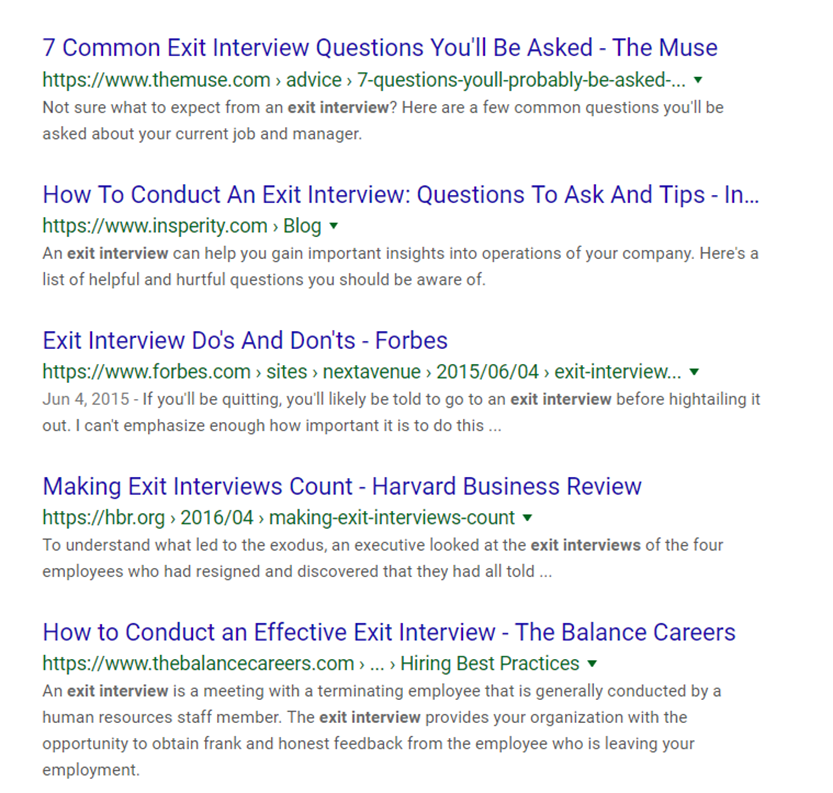
If you sell software to support exit interviews, you shouldn't be trying to shoehorn your homepage into this. You'll have a far easier time if you match the informational intent of the SERP.
How to make great content as a B2B company
For many of us, that leaves us at content as the thing we have to do.
How can we do it well as a B2B company?
Lets go through 6 steps.
- Setting expectations
- Building a keyword universe
- Grouping keywords
- Prioritising
- Creating content
- Measuring
Setting expectations
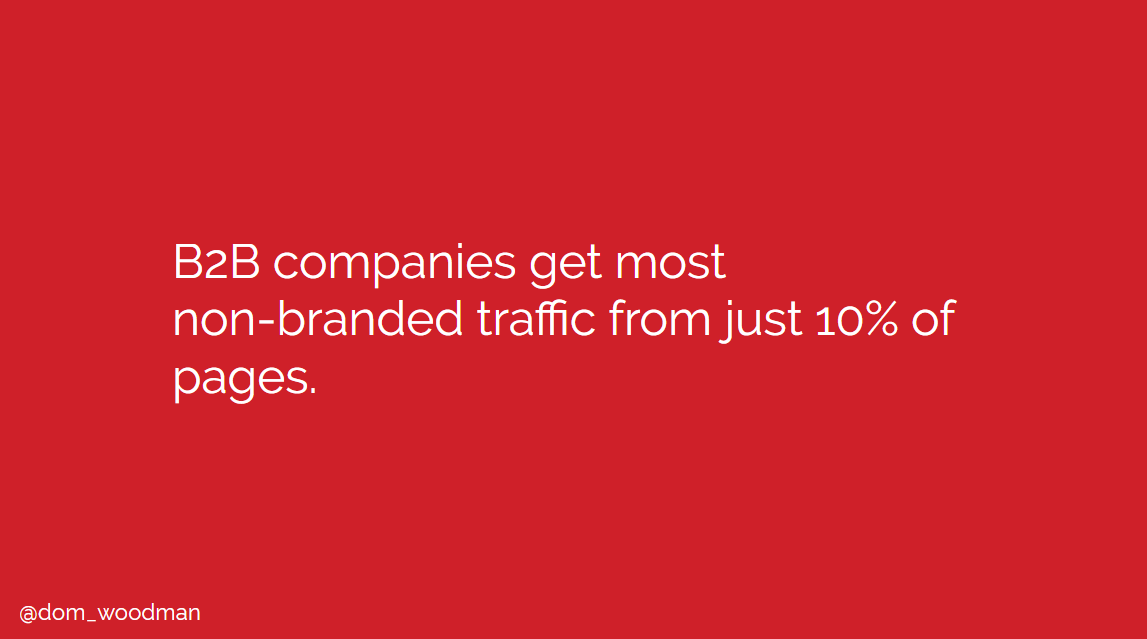
You've already heard some form of this right? Most content doesn't work. Even with good promotion not everything you have is going to take off.
We need to set those expectations upfront or we might end up with our content efforts getting the plug pulled halfway through.
Building a keyword universe
This is a really fancy way of "get all the keywords".
Take your customer journey, work out everything someone might search which would put them in your funnel and dump it into a spreadsheet.
If you're feeling really unimaginative, just get everything your competitors rank for.
Group those keywords
Now we need to group those keywords & we're going to do it in two ways.
Good ol' fashioned topic grouping
First we're just going to group them by topic. Time use Excel or Google sheets to group these keywords into sensible topics. These topics will change depending on your area, I'll usually have two columns:
- Primary topic
- Sub topic.
I'll then usually have some other categorisation columns I'll add as well:
- Branded: Brand, non-brand, competitor brand
- Information or transactional
- Sales funnel groups: e.g. Awareness, consideration, comparison, purchase
SERP grouping
Then within our topic, we'll end up going:
- How many pages should we have?
We have a bunch of keywords about enterprise content marketing. How many pages should it be?
Take these two keywords.
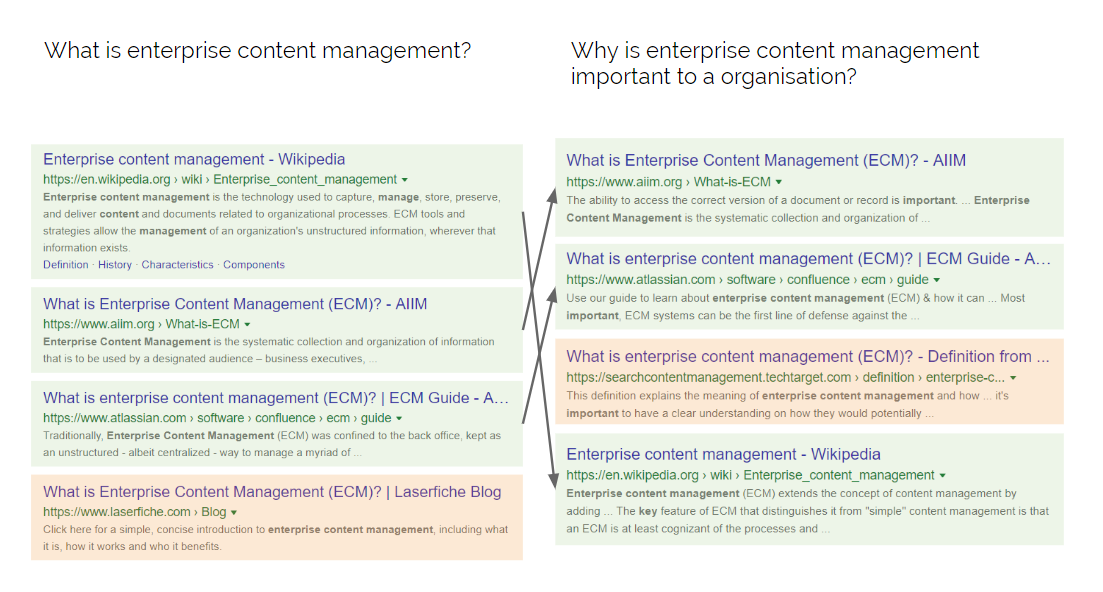
The SERPs have a lot of overlap in ranking URLs. We probably don't want two separate pages for those two terms.
Take these two in content marketing. There is no overlap in URLs that rank for these two SERPs.
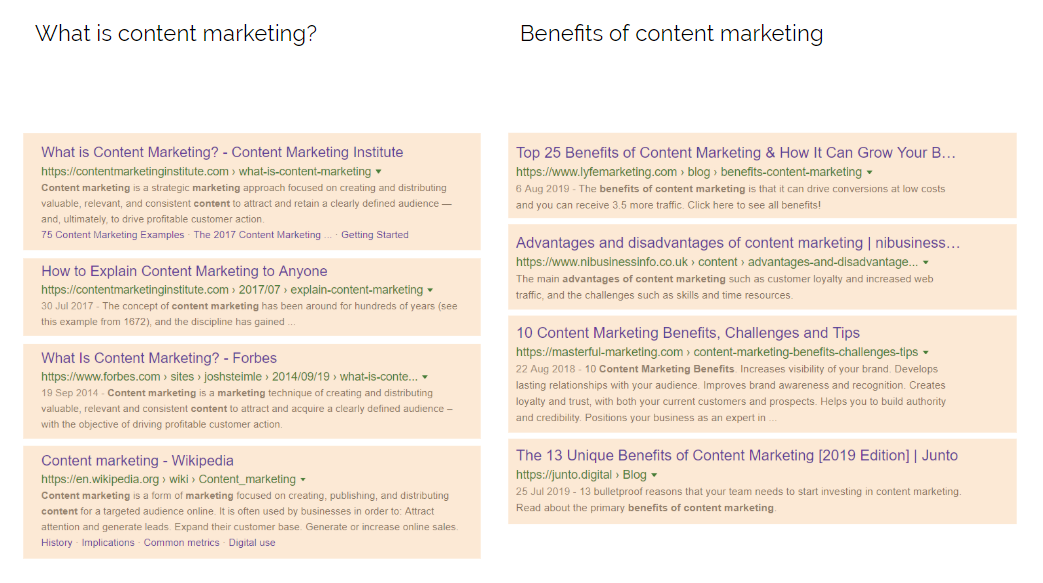
We probably do want two separate pages here.
You can do some overly clever things here to calculate this (watch this space), but at the scale most companies can create content, if you've already done some basic grouping and done some prioritisation (the next section), you can probably manage this by hand.
Prioritising
Now we've got a big list of keywords that's roughly categorised.
But not all of them will be good pieces of content that will work for your audience.
How can we narrow this down.
Which topics convert?
Certain topics will just be closer to your product or the messages you want your product to convey, certain areas will convert better.
You need to find those out. Often as marketers we lack that more general knowledge about our product and you're going to need to go and get it.
- First stop - actual users
- Second stop - sales
- Third stop - anyone who is paying for ads.
Particularly if you're coming as an external consultant (as I often am), you're going to need to build this knowledge.
Writing for the SERP
Then you need to find areas where you think you can write for the SERP.
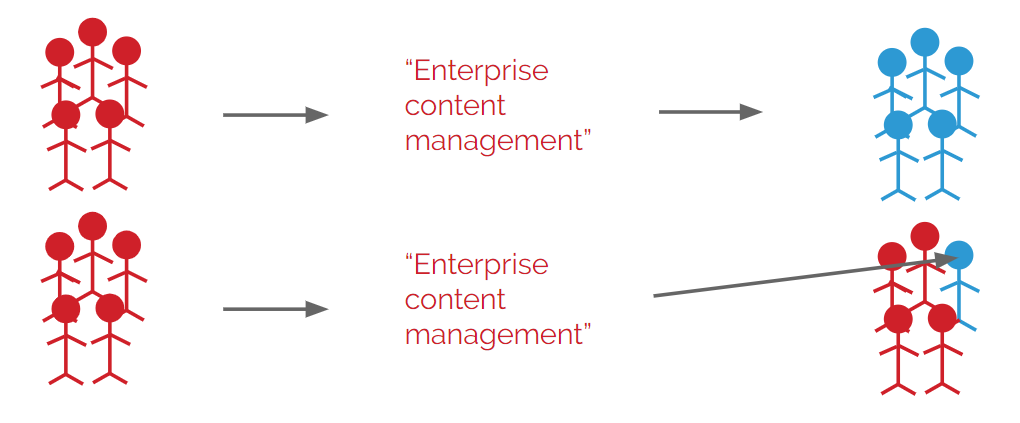
In our example above, we've got 5 people searching for "enterprise content management".
Google wants all those 5 users to have a good time. It's going to collect user experience metrics from all of them.
But we only want to sell to one of them. So we write our article for CEOs.
Then 4 people have a bad experience, Google see's people having a bad time and we rank poorly.
You need to write for the SERP and be able to allow qualified users to jump in where useful. Find the areas where you feel you can do this and the rest of the business will let you.
Having opinions
Content without opinions just isn't as interesting.

Another excellent way to prioritise your content is to see where you're willing to have opinions.
If you don't have opinions find people who do. That's typically people who do whatever you're writing about. Find them and add their opinions the facts you can find.
This point is particularly important for B2B. We'll come back to it again later.
You'll also need to check where your company is willing to have opinions. B2B companies tend to be even less willing to have opinions that B2C companies.
Unique data
Data is another great way of enriching content.
Sometimes you'll hit it lucky and have internal unique company data.
Other times you'll have to source the data yourself. You don't need even need to do much dressing up of that data. You just need some data :)
Sadly that data doesn't even need to be that good. I would love to tell you otherwise, but personal experience has shown that people seem to get away with murder when it comes to bad data.
Just make sure you dress it up well. There's probably an entire other blogpost to be had here.
Matching format to SERP
Some SERPs are crying out for a specific format of content. Take this SERP for cost of living.
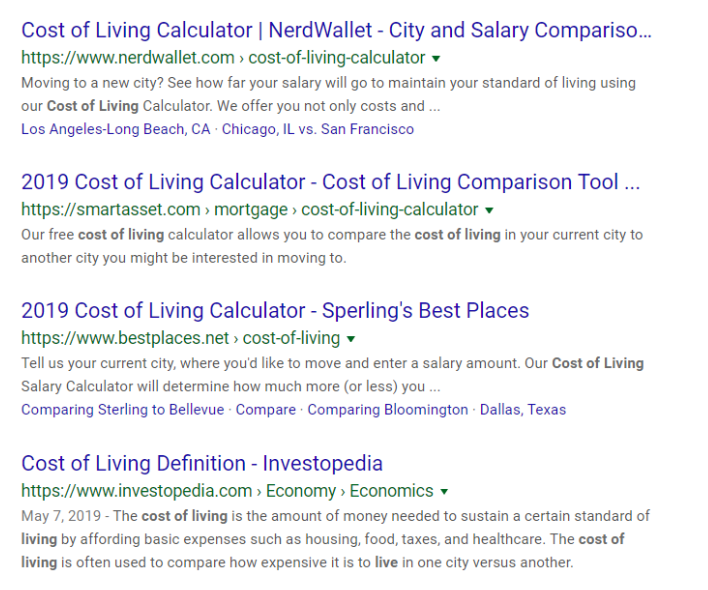
This SERP is clearly crying out for calculator. If you can't build a calculator, this probably isn't the best term to target.
If you can't make certain formats, certain SERPs will just be harder to target.
Creating content
Now we need to actually make the content. We're not going to talk about generic content generation, rather we'll only focus on some points specifically relevant to B2B.
Pulling in the experts
This is probably the main mistake I see.
B2B can often be very industry specific & technical. Not everyone can write about these topics well.
If you're trying to write articles as just the SEO/content person or agency, without any input from experts it's often a struggle. The more technical your area, the worse this is.
For many industries you will absolutely need time from the experts, you will need their opinions and maybe even need some actual writing from them. (If they're time pressed, you could just record them talking & write it up).
This is often crucial to the content success. Tell this to people, tell it to your boss, tell it to the person who wants all these organic visits.
Pulling in a community
Do you have a community?
Could you be curating this content from your community? Do you in fact have a lot of this content already?
If you don't have one, building a new one isn't a decision to be made lightly (I wouldn't ever recommend doing this just for search), but particularly if you already have a community, you should consider if there is anything you can do here.
Pulling in outside experts
We all know guest posting for links. But the other side can be pretty great too. Take guest posts for content.
It's very likely unless you're offering something pretty good (a large audience, a high quality post etc.) you probably won't get anything good for this.
Getting something set-up for this is often a long play. It can work, look no further than Moz in our industry for an example of it working really well. But it is does tend to be a long play.
Measuring content
Measuring value search in B2B can be fiddly.
As we mentioned in a previous section, a combination of the long sales funnel, organic playing higher up in it and multiple decision makers all makes it harder to attribute value to search.
How can we still show that our content is changing minds and more specifically changing the right minds?
Attribution
Suppose you have two visits to your website from the same user:
What is attribution
- Visit 1: Organic -> Blog
- Visit 2: PPC -> Landing Page -> Demo
Attribution is how you answer the question:
"Who gets credit for the demo?"
Problems with attribution
We're not going to go into attribution in detail here. We do however need to briefly touch on why it can be really hard:
In order to be accurate attribution needs to know:
- Which visits are from the same user. If we don't know the two visits above are from the same user
There are two main ways that visits from the same user, can be treated as different users.
- Different devices. If you visit a website on a desktop and then again on a mobile (without signing in), you're two different users.
-
Time in between visits. By default GA has a window of 90 days in Chrome. So if you visit on Day1 & you visit on Day 91, it counts as two different users.
- If you're on Safari or Firefox, the window is only 7 days.
Essentially it's hard.
Are the right people having a good experience?
We're still not done.
You know the saying, good is better than perfect?
Well this blog post isn't technically done yet, because I managed to delete a chunk of it yesterday and had to re-write :(
It will be finished off later this afternoon. In the meantime the rest of the content is in the slides at the top. Sorry about that, but check back in, in several hours for it :)